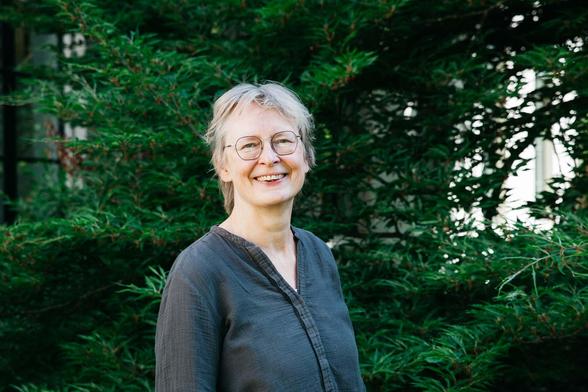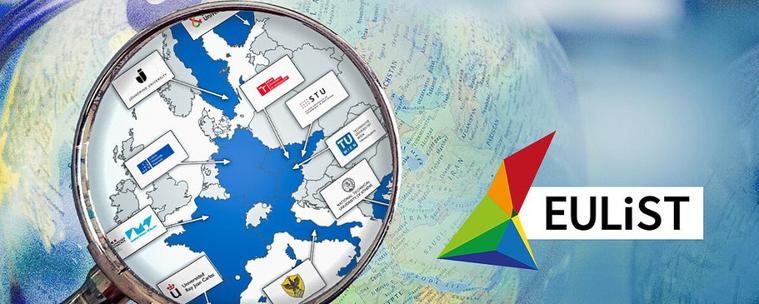Activities of TIB in the European university alliance “EULiST”
diesen Beitrag auf Deutsch lesen
Since 2023, Leibniz University Hannover (LUH) has joined forces with 9 partner universities in the European University Alliance “EULiST – European Universities Linking Society and Technology”. The aim of the funding line announced by the European Commission is to strengthen the European bond through closer institutional cooperation and various exchange programs for the mobility of students, scientists and other university members as well as to improve the competitiveness of European universities. In addition to these goals, the alliance offers the opportunity to develop forms of education and research that are committed to the ideas of the Open Science movement and thus to transparency, accessibility and cooperation in research.
The participating universities are located in Austria, the Czech Republic, Finland, France, Greece, Italy, Spain, Sweden and Slovakia. Aiming toward finding solutions to societal challenges by employing an integrative approach to social, natural and technical sciences, many of them have a focus on the technical and natural sciences and are thus at the core of TIB’s tasks.
The TIB is involved in several processes within the alliance. It contributes its expertise in open software development and open access publishing and thus its many years of experience in the strategic development of open science. It has long been our belief that openness is a key building block for infrastructural and cultural collaboration, as well as for the unification of European campuses. Openness is a prerequisite for the production and distribution of knowledge without access barriers in a democratic manner. Moreover, it also offers practical opportunities for institutional cooperation and for innovative and flexible learning formats.
Development of open digital infrastructures and advice on publishing open access
The first step in bringing together digital offerings was to collect the services of the partner universities in order to develop a joint offering in the form of a Knowledge Hub. In terms of content, the Knowledge Hub thus offers the possibility of making open educational resources (OER), research data, publications and course offerings, among other things, findable across institutions via a central search entry point. As a technical basis, the TIB can build on the results of the Open Educational Resources Search Index OERSI. The subsequent use of the underlying technology has already been successfully tested using the example of research data with the search index for Research Software, Data and Terminologies with ReSoDaTe.
On this basis, work is currently underway on a central course catalog that brings together the courses offered by the partner institutions in one central location and makes them jointly searchable. In addition to specially developed search environments, other platforms such as Open Alex also play an important role, as they already have numerous integrations, particularly in the area of open access, and could potentially make up further components of the Knowledge Hub.
Other services developed at the TIB, such as the “Open Research Knowledge Graph (ORKG)” and the TIB AV-Portal, are also offered to the alliance. For example, there was an introductory webinar in using the AV portal in April 2024 at the Universidad Rey Juan Carlos in Spain. Also in 2024, the TIB organized the one-week online workshop “How is a scientific journal created?” for EULiST students and doctoral candidates. Participants got hands-on experience with all the players, roles, and important topics in the scientific publication process through simulating the founding of an open access journal. All steps were played through and then discussed.
Openness in international university teaching
Openness in teaching is the TIB’s topic in Work Package 3 “Learning and Teaching”. With the “EULiST compatibility check”, a concrete pilot project is in the starting blocks that focuses on and supports teachers as central actors in EULiST teaching cooperation. The offer of the project is a consultation process largely controlled by the teachers, in which the TIB offers support in developing course syllabi according to the principle of openness.
This means, we check the rights of use of teaching materials, including course literature, research open alternatives to content that is currently not freely licensed or check secondary publication rights of materials such as the journal articles. According to the LUH Open Access Policy, LUH members are generally required to upload copies of their publications to the LUH Open Access repository. This therefore applies not only to literature used in courses. Advice on the creation and use of Open Educational Resources (OER) and the integration of Open Science training courses into seminars are also part of the portfolio.
Further plans include networking events for open access officers and counselors from the partner universities as part of a staff exchange to, for example, pool resources in the area of open access advice through training courses developed and offered in cooperation between universities. The first concrete steps in this direction have already been taken through participation in the working meeting of Work Packages 2 and 3 at TU Wien in February 2025.
We hope that these activities will strengthen Open Science in and with the participating institutions.
#AVPortal #EULiST #LizenzCCBY40INT #OERSI #ORKGl #UniversityLibrary




